|
|
|
Sort Order |
|
|
|
Items / Page
|
|
|
|
|
|
|
| Srl | Item |
| 1 |
ID:
122433
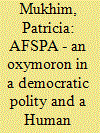

|
|
|
|
|
| Publication |
2013.
|
| Summary/Abstract |
The Armed Forces Special Powers Act (AFSPA) dates back to 1958
when it was passed by the Indian Parliament to quell the Naga rebellion
in a so-called disturbed area. Later it was extended to the states
of Assam, Manipur, Tripura, parts of Meghalaya and Arunachal Pradesh
and later to Jammu and Kashmir in 1990. This Act is a legacy of a
colonial power. The Armed Forces (Special Powers) Ordinance, 1942,
was used by the British to quell dissent during the Second World War.
But even before that it was used as an instrument of repression which
led to the Jallianwala Bagh massacre. It is ironic that a free country
would be waging a war against its own people using all forms of
brutality to secure the nation-building agenda of the State. Why else
would you use the military for an internal rebellion?
|
|
|
|
|
|
|
|
|
|
|
|
|
|
|
|
| 2 |
ID:
122443
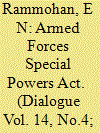

|
|
|
|
|
| Publication |
2013.
|
| Summary/Abstract |
On the 11
th
of July 2004, the personnel of the Assam Rifles picked up a
young woman from her house in Thoubal district at about 2300 hours.
Her house was searched but nothing was found. The Assam Rifles
personnel then arrested her and left after leaving an arrest memo stating
that they had not found anything incriminating. The next morning her
body was found on a nearby hillock with several bullet injuries around
her waist and abdomen. The local people who found her body naturally
thought that she had been raped. This was followed by the extraordinary
spectacle of a group of middle aged and elderly women leading a
march to the gate of the Assam Rifles and disrobing themselves
demanding that they should be raped. The valley then exploded in a
violent agitation that lasted more than a month. Regrettably the reaction
from the Centre was most unsympathetic. The statements made by
some senior officials were particularly insensitive. One stated that the
lady, Thangjom Manorama was a PLA cadre and she was an explosives
expert and several security personnel had been hurt and killed by her
explosive devices. This seemed to imply that her killing was justified.
|
|
|
|
|
|
|
|
|
|
|
|
|
|
|
|
| 3 |
ID:
122435
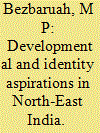

|
|
|
|
|
| Publication |
2013.
|
| Summary/Abstract |
The twin factors of developmental backlog and ethnic identity
aspiration of groups with ambitions for separate homelands have
kept the Northeast Region of India in a perpetual discontentment
in the entire post independence period. Such discontentment has
continually disrupted peace and normalcy in various parts of the
region preventing economic and institutional stabilization required
for higher attainments of human achievements and wellbeing.
The present paper begins with a historical perspective of the
region in the post independent India and looks out for an
approach for addressing the twin issue as a single undertaking
for a lasting solution to the region's vexed problems.
|
|
|
|
|
|
|
|
|
|
|
|
|
|
|
|
| 4 |
ID:
122432
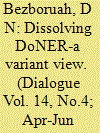

|
|
|
|
|
| Publication |
2013.
|
| Summary/Abstract |
It is no great secret that the UPA government has not been quite happy
with the functioning of the Ministry of Development of the North Eastern
Region (DoNER). The Centre's development funds for the Northeast
have rarely been utilized as they were meant to be, and the utilization
reports as well as the detailed accounts for projects have rarely been
submitted in time (if at all) and there have been serious allegations of
large sums of money being siphoned out to private coffers. All said and
done, there were legitimate complaints that the DoNER Ministry was
functioning inefficiently. As a consequence, a parliamentary committee
was appointed to look into the functioning of the DoNER Ministry and
to make recommendations. Not surprisingly, the committee has
recommended that the Union government dissolve the DoNER Ministry
and put it under the Prime Minister's Office (PMO).
|
|
|
|
|
|
|
|
|
|
|
|
|
|
|
|
| 5 |
ID:
122448
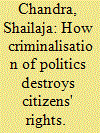

|
|
|
|
|
| Publication |
2013.
|
| Summary/Abstract |
Most of the corruption in developing countries is inherently
political…What is labeled as corruption in developing countries mirrors
the distribution of power within societies. Few anti-corruption
campaigns dare to attack the roots of corruption in such societies as
these roots lie in the distribution of power itself."
1
This paper examines discourses on the nature and extent of
corruption in India and two factors most responsible for it. The main
argument is that unaccounted wealth and the criminalisation of politics
are responsible for important decisions being influenced by extraneous
considerations. When criminal elements hold the reins of government
they show scant concern for citizens' rights; among these the violation
of human rights not only dispossesses those in greatest need but also
brings irreversible consequences that affect generations of citizens.
|
|
|
|
|
|
|
|
|
|
|
|
|
|
|
|
| 6 |
ID:
122440


|
|
|
|
|
| Publication |
2013.
|
| Summary/Abstract |
A Child is born. Its birth represents the duplication of human species.
It becomes a festive occasion of excitement and joy for the parents,
family members and people in the neighborhood. They pray for the
health, happiness and well-being of the new born in the words of
Shuklayajurveda:
'May you live for one hundred years
May you see one hundred autumns in their resplendent glory
May you listen to the whisper of the falling leaves of one hundred
autumns
May you minstrel to humanity
In the language of one hundred autumns'
But the fervour and joy are short-lived. No sooner the baby is out
of the protective warmth of the womb of the mother, it is subjected to a
series of vicissitudes. To start with, there is the incidence of low birth
weight (42.5 PC of children below 5 years in India are underweight
while 69 PC of such children are anaemic) compounded by vulnerability
to series of infections (diarrhoea, dysentery, whooping cough, tetanus,
measles, diphtheria, TB, pleurisy, bronchitis, bronchial asthma and so
on). As the child learns to begin with the first step in the long journey
of life, it falters and falls. Every moment of its evolution and growth
also becomes a moment of accidents which cause injury and, therefore,
anxiety and concern. The pangs of death invade the scene as
unpredictably as the joy of birth.
|
|
|
|
|
|
|
|
|
|
|
|
|
|
|
|
| 7 |
ID:
122447
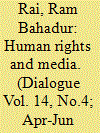

|
|
|
|
|
| Publication |
2013.
|
| Summary/Abstract |
The role of human rights in the modern world has expanded. This is in
response to the need of the times. The human rights issues are becoming
crucial to human society. Numerous international treaties and
conventions have been formulated and signed to preserve and secure
these rights. Many important conferences have helped in defining the
contours of these rights. These have led many countries to adopt them
through legislative and constitutional measures. India has also set up a
Human Rights Commission, which is an active and vibrant entity
|
|
|
|
|
|
|
|
|
|
|
|
|
|
|
|
| 8 |
ID:
122441
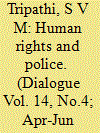

|
|
|
|
|
| Publication |
2013.
|
| Summary/Abstract |
Dignity of the individual was dear to the makers of our Constitution as
they had followed the torch lit by Mahatma Gandhi. All individuals,
especially the downtrodden, were considered as the manifestation of
Godhood by the Father of Nation. Consequently, in the very preamble
of our constitution, it was resolved to secure to all the citizens "Fraternity
assuring the dignity of the individual and the unity of the Nation." To
carry out this intention fully a number of fundamental rights were given
to individuals, some of them only bestowed on citizens of India. Barring
a few exceptions the fundamental rights function as limitation on the
State action. Sufficient provisions for protection against violation of
Human Rights by non-state players are incorporated in the ordinary
laws of the land. We have only to turn our eyes to some of our subcontinental neighbours to realize how important it is to protect the
individual against an unfettered State.
|
|
|
|
|
|
|
|
|
|
|
|
|
|
|
|
| 9 |
ID:
122444


|
|
|
|
|
| Publication |
2013.
|
| Summary/Abstract |
The credit for bringing the Human Rights issue into public consciousness
and making it a major concern of public interest in India goes ironically
to terrorism. With the outbreak of terrorism in Punjab in 1980s
necessitating large scale deployment of armed forces in aid of Police
and the emergence of public spirited individuals and groups ready to
take up cudgels on behalf of the victims of State excesses, the violations
of citizens' rights and liberties became a regular feature of law
enforcement. Before this, far greater atrocities committed by the police
and administration in dealing with the problems of interstate dacoity
and communal riots in various States and in fighting insurgency in the
North-East had failed to generate any significant reaction among the
general public. It is also worth noting that Pakistan could ultimately
succeed in internationalizing the Kashmir issue not on the strength of
its claims vis-à-vis ours but from the angle of the alleged human rights
violations by Security forces. It is thus clear that terrorism plays a
crucial role in determining the human rights discourse and shaping the
human rights record of a nation State.
|
|
|
|
|
|
|
|
|
|
|
|
|
|
|
|
| 10 |
ID:
122442


|
|
|
|
|
| Publication |
2013.
|
| Summary/Abstract |
India is an ancient civilisation. The concepts of 'human dignity'
and 'tolerance' are intrinsic to the Indian thought. 'Dharma' is a
distinctive concept which personifies recognition of dignified human
interaction. Indian notions of 'Vasudev Kutumbakum' (universal
brotherhood) and 'Sarvebhavantusukhinam' (may all be happy)
exemplifies the cultural orientation of the society at large towards
common wellbeing of the human race!
|
|
|
|
|
|
|
|
|
|
|
|
|
|
|
|
| 11 |
ID:
122439
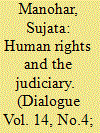

|
|
|
|
|
| Publication |
2013.
|
| Summary/Abstract |
1. Justice Louise Arbor, the former UN Commissioner for Human Rights
in her address at the opening of 61
st
session of the Commission on
Human Rights emphasized the role of the Judiciary in the enforcement
of Human Rights. She said, "Courts the world over have been playing
an increasingly vital role in enforcing social and economic rights,
bringing them from the realms of charity to the reach of justice, linking
them and developing a body of ever-growing jurisprudence by which
we can be guided in bringing these vital rights to the reality of peoples'
lives". In order to understand the impact of international law, and in
particular, international human rights law on judicial decision-making,
one needs to look at the ways in which public international law has
affected decision-making in several jurisdictions around the world.
|
|
|
|
|
|
|
|
|
|
|
|
|
|
|
|
| 12 |
ID:
122449
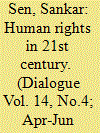

|
|
|
|
|
| Publication |
2013.
|
| Summary/Abstract |
Human rights have been described as those minimal rights that every
individual must have by virtue of his being a member of human family
irrespective of any other consideration. They are based upon mankind's
demand for a life in which the inherent dignity of a human being will
receive respect and consideration. These rights are essential liberties
taken for granted as the basis for a just and civilized society and are
not subjected to political bargaining or calculation of social interest.
The concept of human rights is old and rooted in history. From
ancient times to modern day human rights in various forms have been
the cultural heritage of all mankind. In 1968 as a part of the contribution
to International Human Rights Year, the UNESCO published a collection
of texts entitled "The Birth Right of Man" which illustrated the concept
of human rights from different cultural traditions and periods of history.
Ideology of human rights is thus not the exclusive product of Western
Europe.
|
|
|
|
|
|
|
|
|
|
|
|
|
|
|
|
| 13 |
ID:
122446
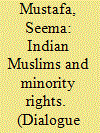

|
|
|
|
|
| Publication |
2013.
|
| Summary/Abstract |
Post 9/11, the West descended on India seeking answers to the one
question: why are Indian Muslims not terrorists? I attended any number
of 'private' meetings organized by embassies of the Western countries
in New Delhi with Muslims in India and their behavior patterns as the
sole issue for discussion. In the process one ate a variety of cuisines,
joining other carefully selected Muslims to help the missions and their
governments understand the 'peculiar' character of the Indian Muslims
that kept them away from the turbulence of Pakistan and the Middle
East, and secular in their response. Paradoxically, the official
Government of India position is that Indian Muslims are not terrorists,
even though covertly more and more are being arrested and detained
under various terror laws.
|
|
|
|
|
|
|
|
|
|
|
|
|
|
|
|
| 14 |
ID:
122445
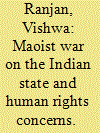

|
|
|
|
|
| Publication |
2013.
|
| Summary/Abstract |
With the merger of three naxalite groups, the CPIML (People's War
Group), MCC and CPIML (Party unity) into CPI (Maoist) in 2004, a
highly sophisticated and militarized Maoist group was formed. Unlike
its predecessors in the Naxalbari movement and its aftermath, the CPI
(Maoist) in its first unity congress declared war on the Indian state.
The Maoist documents are quite clear of this intention. Unfortunately,
this fact has never been accepted as such by the Central or the State
governments. While the Indian Prime Minister declared it as the "greatest
challenge to our internal security", it was generally considered a law
and order problem to be dealt by the states and the role of the central
government was limited to small or large scale help in manpower and
material. While off and on the Maoist war has been called 'insurgency'
(internal war) in documents of the government, it has not been generally
the case. An insufficient definition of a problem leads to inadequate
response which has been the case on the Maoist issue leading to
continuous expansion of Maoist area of influence in India.
|
|
|
|
|
|
|
|
|
|
|
|
|
|
|
|
| 15 |
ID:
122434


|
|
|
|
|
| Publication |
2013.
|
| Summary/Abstract |
The news that the battle of Imphal-Kohima during the Second World
World War (WWII) was voted in Britain as Britain's most hard fought
and significant battle in its entire history, ought to excite more than
mere wonderment in the two states that remote as they are, they had been the pivot around which an important chapter of the history of the
world actually turned so significantly. There undoubtedly would be a
mixed sense of awe, pride and victimhood in both the places at the
confirmation that they had been in the eye of a violent campaign of a
magnitude they had never ever imagined before. There would also be
an equally understandable sense of sudden importance at this revelation.
These senses of elation, expectations and awe however can only at best
be ephemeral, acquiring a place in the iconic memory of the place for a
brief period before fading and ultimately disappearing into the nebulous
pit of oblivion public memory is generally destined for. That is, if no
tangible official effort is made to capitalise on this sudden turn of
world consciousness.
|
|
|
|
|
|
|
|
|
|
|
|
|
|
|
|
| 16 |
ID:
122436
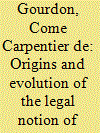

|
|
|
|
|
| Publication |
2013.
|
| Summary/Abstract |
In ancient and medieval western societies rights were prerogatives
enjoyed by the privileged minorities and by free men, as opposed to
slaves and bonded labour. By definition rights were thus unequally
distributed as males had more than women or children on whom within
their respective families, they had nearly absolute authority, just as
religious and land-owning (feudal) dignitaries held power over those
below them in the social hierarchy. Britain's coat of arms carries the
medieval motto: Dieu et mon droit, signifying "God and what I am
entitled to" by feudal or customary law or by divine right.
|
|
|
|
|
|
|
|
|
|
|
|
|
|
|
|
| 17 |
ID:
122450


|
|
|
|
|
| Publication |
2013.
|
| Summary/Abstract |
The universalization of human rights is a political fact. Being a human
being one is entitled to have basic rights. Human rights being eternal
part of the nature of human beings are essential for individuals to
develop their personality, their human qualities, their intelligence, talent
and conscience and to enable them to satisfy their spiritual and other
higher needs. All human rights derive from the dignity and worth inherent
in the human person and that the human person is the central subject of
Human Rights and fundamental freedom. The concept of human rights
is a crystallization of values that are the common heritage of mankind.
|
|
|
|
|
|
|
|
|
|
|
|
|
|
|
|
| 18 |
ID:
122437


|
|
|
|
|
| Publication |
2013.
|
| Summary/Abstract |
The time it was written the Universal Declaration of Human Rights
(UDHR) was a very appropriate document. Prepared at the aftermath
of the World War II it was a response to the unspeakable harm suffered
by millions immediately before, at the hands of Nazism and
Communism. Both these regimes, in the countries they ruled treated
people inhumanly with tortures and killings at will. To the outside
world their common refrain, if at all, was that it is their internal affair.
The UDHR tried to reject this attitude of dictatorial and totalitarian
regimes. Thus, human rights of everyone were formulated as independent
of the work one does for living or the place one lives in. Human rights
are the rights of everybody in the world because one is human being.
All people, irrespective of the country or political system, are equally
entitled to them. This way the UDHR was a standard narration of what
human rights mean. Adopted by the United Nations in 1948, the thirty
articles of this declaration is a basic text to understand and uphold
human rights.
|
|
|
|
|
|
|
|
|
|
|
|
|
|
|
|
| 19 |
ID:
122438


|
|
|
|
|
| Publication |
2013.
|
| Summary/Abstract |
Whereas recognition of the inherent dignity and of the equal and
inalienable rights of all members of the human family is the foundation
of freedom, justice and peace in the world,
Whereas disregard and contempt for human rights have resulted in
barbarous acts which have outraged the conscience of mankind, and
the advent of a world in which human beings shall enjoy freedom of
speech and belief and freedom from fear and want has been proclaimed
as the highest aspiration of the common people.
|
|
|
|
|
|
|
|
|
|
|
|
|
|
|
|
| 20 |
ID:
122451
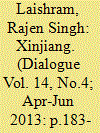

|
|
|
|
|
| Publication |
2013.
|
| Summary/Abstract |
The disquiet in Xinjiang province of the People's Republic of China
(PRC) is becoming acute. A series of events in the recent past attest to
the gravity of the situation and are suggestive of the tenuous Chinese
control in this 'new' frontier province of China. The trajectories of
contest in Xinjiang or Sinkiang appear to be inherent in the frontier
areas of any vast country wherein race, religion, culture and historical
memories impinge. The frontier area, Xinjiang, is a zone "in which all
possible boundaries of geography, race and culture cross and overlap
to form a broad transitional area of great complexity".
1
Xinjiang has
been continually remote from the power centre, with visible patterns of
'incomplete authority' or 'legitimacy crisis' from the central authority.
In addition, the depiction that inhabitants of the frontier areas are
"ethnically different from each empire's ruling elite or majority and
that there was little identification with the central regimes"
2
has
relevance in the case of Xinjiang. An avid writer notes, the history of
Xinjiang is a story of many interactions¯people, cultures and politics¯not
of a single nation but of many overlapping political and social groupings
before the racial or the national categorisation of 'Turkic,' 'Uyghur'
and 'Chinese', which became evident in the twentieth century.
3
|
|
|
|
|
|
|
|
|
|
|
|
|
|
|
|
|
|
|
|
|